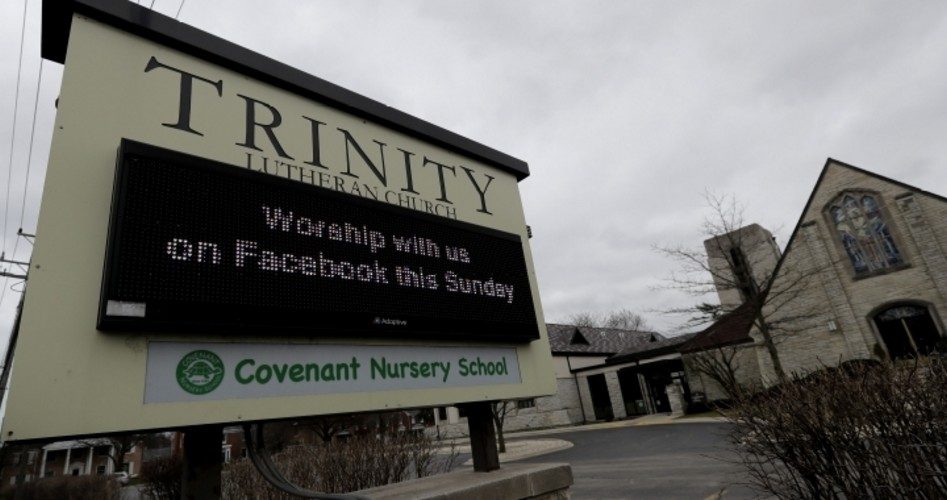
Two Illinois churches have filed a federal lawsuit challenging Governor J.B. Pritzker’s “Five Point” coronavirus plan to reopen the state. The plan potentially prohibits religious gatherings of 50 people or more through 2021, or when a vaccine or viable treatment option becomes available.
Under Pritzker’s “Five Point” plan announced last week, churches will continue to be impacted by social-distancing requirements. According to Pritzker’s plan, Illinois is currently in Phase 2. Phase 3, which would allow gatherings of up to 10 people, may not be reached until the end of May at the very earliest, Catholic News Agency reports. The plan will allow for gatherings of up to 50 people when “Phase 4” is reached, and gatherings of more than 50 people will be allowed under “Phase 5,” at which time a “vaccine or highly effective treatment widely available or the elimination of any new cases” is expected. The Chicago Sun-Times reports the movement between phases will be based on “specific public health metrics.”
On Friday, Elim Romanian Pentecostal Church and Logos Baptist Ministries filed for a temporary restraining order against the enforcement of the plan, the Daily Wire reports.
“Plaintiffs merely seek a [temporary restraining order] preventing plaintiffs, their pastors, and their congregants from being subject to criminal sanctions for hosting in-person worship on Sunday during which plaintiffs will implement social distancing and hygiene protections on an equal basis with other non-religious gatherings,” the lawsuit reads.
The two churches outlined social-distancing guidelines they would implement if permitted to proceed with church services, including removing chairs to increase distance between parishioners, sanitizing the facilities before services, requiring attendees to wear masks and/or gloves, providing hand sanitizer for public use, and staging different exits and entrances.
Until recently, religious services of any kind had been prohibited in Illinois under Pritzker’s orders. It wasn’t until the Thomas More Society filed a lawsuit on behalf of The Beloved Church of Lena on April 30 that the governor added a paragraph to his extended stay-at-home order that declared religious exercise “essential” and allowed citizens to leave their homes to attend religious services as long as there 10 or fewer people gathered for worship, CBS Local Chicago reported.
And while the church welcomed Pritzker’s changes to the order after it filed suit, it contends the changes do not undo the damage being inflicted by the governor’s overeall order.
The Beloved Church of Lena has appealed its case to the 7th Circuit Court of Appeals after U.S. District Judge John Z. Lee ruled against it on May 3. Judge Lee determined the governor’s goal of “saving lives” outweighs the church’s right to gather. The appeal asks the court to weigh in on whether Pritzker’s actions to address the COVID-19 pandemic violate the rights of Illinois residents.
Peter Breen of the Thomas More Society told Catholic News Service (CNS) last week, “[Pritzker] has at least brought churches out of the abyss of ‘non-essential,’ but he has not fully elevated them to the heights of being an ‘essential’ business or operation.”
Breen opines that businesses deemed “essential” are not subject to the 10-person rule, which is nonsensical from a public-health perspective. If gatherings of 10 or more increase the spread of COVID-19 and pose a danger to public health, they should be prohibited everywhere. Since that is an impossibility, as it would prohibit people from engaging in life-sustaining activities such as food shopping, going to the doctor, etc., it seems allowing some businesses to engage in larger gatherings while prohibiting others from doing so amounts to discrimination.
“Governor Pritzker’s arbitrary 10-person limit applies only to churches but not to the many other businesses open in Illinois today, from liquor stores to lawyers to pet groomers,” said Breen. “Our constitution requires that churches receive at least equal treatment as any secular enterprise.”
“Pritzker’s latest threat of jail for people of faith is outrageous,” Breen added, referring to a comment from Pritzker during a May 4 COVID-19 press briefing stating those who were “persistently defiant” of his executive orders risked being “put in jail — “and we will seek immediate relief from the court of appeals to defend our clients.”
Still, the governor’s office seized on Judge Lee’s ruling to claim it was proof Pritzker’s orders are constitutional.
“The governor’s executive order protects the free exercise of religion,” said Pritzker’s press secretary, Jordan Abudayyeh. “In the last week, a federal court has considered these exact claims and arguments and ruled that the executive order does not violate the constitution.”
Photo: AP Images
Raven Clabough acquired her bachelor’s and master’s degrees in English at the University of Albany in upstate New York. She currently lives in Pennsylvania and has been a writer for The New American since 2010.





